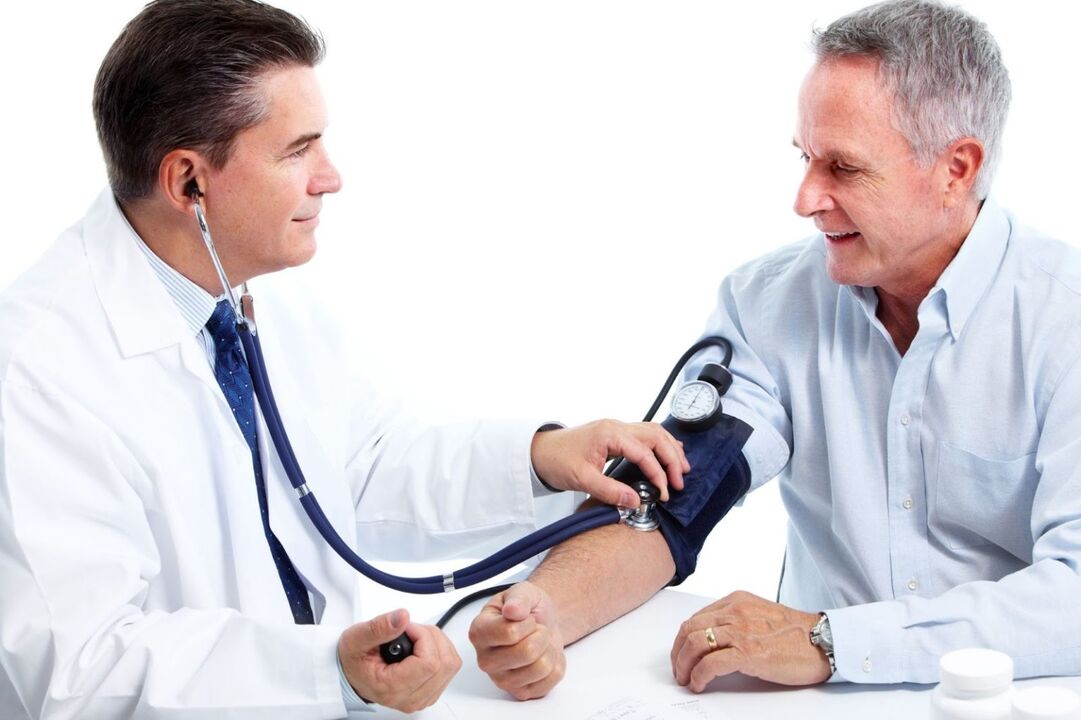With greater blood pressure (blood pressure) or hypertension, as a rule, pensioners suffer, although recently the ailment has become increasingly to appear among young people.At the same time, people often do not suspect a serious problem, many cancel the headaches in the lower sleep or bad weather.The lack of high pressure treatment can lead to the development of stroke, heart attack.Therefore, for the timely detection of the disease, it is necessary to study in detail the main causes of hypertension.
What is hypertension?
Arterial hypertension (hypertension), hypertension or hypertension is a serious chronic disease, which is characterized by a persistent increase in blood pressure (while indicators of the systolic superior pressure are greater than 140 mm Hg and the lower diastolic pressure above 90 mm Hg).Hypertension is the most common disease of the cardiovascular system.There is an increase in blood pressure in the vessels due to the narrowing of the arteries and their small branches: the arterioles.
The value of blood pressure depends on peripheral resistance, the elasticity of the vessels.With the irritation of hypothalamus receptors, in large quantities, renin-angiotensin-aldosterone hormones that cause microsuid and arteries spasms, swelling their walls, an increase in blood viscosity begins to occur.This leads to the appearance of arterial hypertension, which finally becomes irreversible, stable.There are two forms of high pressure:
- Essential (primary).It is 95% of cases of hypertension.The reason for the appearance in this way is all of different factors (inheritance, poor ecology, excess weight).
- Secondary.Represents 5% of cases of hypertension.High blood pressure in this form is caused by body disorders (kidney, liver, heart disease).
The initial stage of the disease or its hidden course can be suspected if a person is observed:
- Memory deterioration;
- headache;
- sensation of demotivated anxiety;
- chill;
- hyperhidrosis (increase in sweating);
- small spots in front of the eyes;
- fingertips of fingers;
- hyperemia (redness) of the skin of the frontal area;
- heartbeat;
- irritability;
- Low performance;
- Face of the face in the morning.
The causes of hypertension
With the normal functioning of the body, the heart drives blood through all vessels, delivering nutrients and oxygen to cells.If the arteries lose their elasticity or obstruction, the heart begins to function stronger, the tone of the blood vessels increases and its diameter is narrowed, which leads to high pressure.The beginning of hypertension is due to autonomic and central nervous system disorders, which are closely related to emotions.Therefore, when a person is nervous, it often begins to increase the pressure.
After 60 years, the development of arterial hypertension is associated with the appearance of atherosclerosis (chronic arteries) when cholesterol plates overlap the normal blood flow.In this case, the superior pressure in the patient can increase to 170 mm Hg.Art., And the background remains less than 90 mm Hg.Art.In addition, many doctors identify the general causes of arterial hypertension:
- violation of the blood circulation of all vital organs;
- excess psychomotional excess;
- sponsing the muscles of the cervical vertebrae;
- genetic pathology;
- reduction of elasticity, thickening of blood vessels;
- Hypocinesia (sedentary lifestyle);
- hormonal changes;
- Diseases of internal organs (liver, kidneys).
- Excessive salt consumption;
- bad habits.

In men
The appearance of hypertension, as a rule, is subject to men from 35 to 50 years.High blood pressure is diagnosed in patients who already have a stable form of the disease.This is due to the fact that men ignore the first signs of the disease.Often, the causes of high blood pressure in the strong half of humanity are caused by their work.The disease affects people whose activities are associated with strong physical and mental stress.Responsible workers suffer from the disease, for whom any error is always strong stress.Other causes of hypertension in men:
- Smoking, alcohol abuse;
- sedentary lifestyle;
- Failure to comply with nutritional rules (fast food, sweets);
- kidney diseases (glomerulonephritis, pyelonephritis, urolitiasis);
- take drugs (cold drugs, colds, sleeping pills or hormonal medications);
- negligence of physical activity;
- Problems with blood vessels (atherosclerosis);
- Traumatization of the central nervous system (central nervous system).
In women
The symptoms of the manifestations of arterial hypertension in women and men are not particularly different (lack of breath, headache, ears in the ears, dizziness), but it is much more likely that the weakest sex is found with such illness.The causes of hypertension in women may differ from similar to men, and this is due to hormones.There are even such forms of the disease that are not characteristic of strong sex at all: this is hypertension with menopause and during pregnancy.
As a general rule, in women, hypertension is diagnosed during menopause (after 45 - 50 years).The body at this time undergoes significant changes: the number of estrogens produced begins to contract.In addition, the causes of hypertension in women can be the following:
- contraceptive reception;
- stress, overload;
- insufficient amount of potassium in the body;
- Hypodinamia (sedentary lifestyle);
- excess body weight;
- poor nutrition;
- delivery;
- bad habits (alcoholism, smoking);
- diabetes mellitus;
- cholesterol metabolism;
- Kidneys pathology, adrenal glands;
- vascular diseases;
- Obstructive apnea syndrome (respiratory arrest).
At an early age
Hypertonic disease is rarely observed in people under 25 years.Often, an increase in blood pressure at an early age is associated with neurocirculatory dystonia (a complex of cardiovascular system disorders), when only higher pressure indicators change.The cause of these violations in children can be a great burden during school classes.In almost all cases, high blood pressure in the child is a consequence of the pathology of the endocrine system, that is, the hypertension of children is usually secondary.The development of arterial hypertension at an early age can have other causes:
- hereditary factor;
- Eating in excess, the use of a large amount of salt;
- climatic conditions;
- Spine diseases.
- electromagnetic, sound radiation;
- nervous overload;
- renal pathologies;
- drug intake that affect the condition of blood pressure;
- overweight;
- Lack of potassium in the body.
- It does not complement the sleep regime.
The reasons for the development of hypertension
The appearance of hypertension in 90 % of patients is associated with cardiovascular problems (atherosclerosis, heart pain, etc.).The remaining 10% is related to symptomatic hypertension, that is, high blood pressure is a sign of another disease (renal inflammation, adrenal tumors, narrowing of renal arteries), hormonal insufficiency, diabetes, traumatic brain lesion and stress.The risk factors for hypertension development are classified according to two indicators:
- Unmounted.The reasons why a person cannot affect.This includes:
- Inheritance.Arterial hypertension is considered a disease transmitted through genes.Therefore, if the family had patients with hypertension, there is the possibility that the ailment appears in the next generation.
- Physiological factor.Men in Middle Ages are more susceptible to disease than to the most fair sex.This is explained by the fact that in the period of 20 to 50 years of age, the body of a woman produces more sex hormones that perform a protective function.
- Change.Factors that depend on a person, their lifestyle and decisions:
- sedentary lifestyle;
- Overweight;
- stress;
- bad habits;
- insomnia;
- the use of a large amount of caffeine, salt, cholesterol;
- take medications;
- weightlifting;
- Climatic fluctuations.

Inheritance
One of the factors of predisposition to arterial hypertension is inheritance.These can be anatomical characteristics that are transmitted with genes.They are expressed in the difficulty of blood flow, which affects the increase in blood pressure.The presence of hypertension in the relatives of the first link (mother, father, grandparents, brothers or native sisters) means a high probability of developing the disease.The risk of appearance of the disease increases if high blood pressure was observed at the same time in several relatives.
As a general rule, hypertension in itself is genetically inherited, but it is only a predisposition to it, this is due to neuropsychic reactions and metabolic characteristics (carbohydrates, fats).Often, the implementation of a tendency to the pathology of inheritance is due to external influences: nutrition, living conditions, adverse climatic factors.
Diseases
Cardiovascular diseases (heart disease, ischemia) can cause high blood pressure.With these ailments, the aorta gaps are partially reduced, it means that the pressure increases.Vascular defects in nodular polyartritis also contribute to blood pressure growth.Diabetes mellitus is another cause of arterial hypertension.The presence of atherosclerotic plaques narrows the light of blood vessels, which is an obstacle to normal blood circulation.The heart begins to work in improved mode, creating greater pressure.Diseases that can cause hypertension:
- renal inflammation;
- lymphatic system and liver pathologies;
- cervical osteochondrosis;
- violation of the pancreas and the thyroid gland;
- arteries sclerosis;
- vegetative-vascular dystonia;
- adrenal tumor;
- traumatic brain injuries;
- narrowing of renal arteries.
Hormonal changes
The violations of the endocrine organs (thyroid gland, hypothalamus, pancreas, adrenal glands) are frequent causes of high pressure.These pathological processes slow down the production of sex hormones and their effect on the brain of the lowest appendix, especially for women during menopause.The serious causes of the increase in blood pressure, which contribute to the excessive synthesis of hormones, are the following diseases:
- Kushing syndrome;
- thyrotoxicosis (hyperthyroidism): an increase in the functions of the thyroid gland;
- neoplasms in the adrenal glands;
- acromegaly (deteriorated function of the anterior pituitary gland);
- Pheochromocytoma (active hormonal tumor);
- Kon syndrome.
Age
Hypertension, as a rule, is observed more frequently in older people.This is due to the fact that over time, arteries lose their elasticity, and this has a great influence on pressure.In addition, in people after 40 years, metabolic processes slow down, in the context of the consumption of a large amount of high rating foods and an incorrect attitude towards food, obesity develops and then hypertension.
Today, such a cause of the disease, as age, has undergone changes.The disease is remarkably young, approximately 10% of adolescents are subject to pathology and, as they grow, the percentage only increases.Each third resident after 40 years suffers from high pressure.In fact, in addition to the natural decline of body resistance, the influence of inheritance, lifestyle changes with age.
Life
Another cause of arterial hypertension is the lack of physical activity.Sports have a beneficial effect on blood circulation and body as a whole, but not many people decide to start leading an active lifestyle to protect themselves from the development of hypertension.The lack of physical exercises causes obesity and overweight and, as a result, blood pressure increases.
Hypocinesia is a common disease of our time, when a person moves little, and this leads to a violation of the work of blood vessels.Light healthy nutrition, bad habits, inappropriate lifestyle cause high blood pressure, since the weakening of muscle tissue and column reduces the tone of the blood vessels necessary for good blood circulation.Working on the computer also increases the risk of disease.

Nutrition
The next factor that contributes to the appearance of high blood pressure is poor nutrition.Salt, sweet, fried, acute, smoked and fat, often causes an increase in unplanned pressure.In fact, to eliminate excess sodium from the body, kidneys require some time.Until the moment this does not happen, excess salt contains water, which causes swelling in people suffering from hypertension.
Lack of potassium can increase blood pressure.This element helps to relax blood vessels and body, sodium free.There is a lot of potassium in tomatoes, dairy products, cocoa, potatoes, legumes, parsley, plums, melons, bananas, green vegetables, sunflower seeds.These products should be included in the daily diet.It is necessary to reject fat, fat and smoked meats, since they lead to excess weight and often accompany high pressure.In addition, such food products are harmful to the body:
- butter;
- canned food;
- offal;
- Gorda sour cream, cream;
- sharp condiments;
- flour products;
- Tonic drinks with caffeine;
- Sweet soda drinks.
Bad habits
A high dose of alcohol and the hangover caused by this hangover negatively affects the state of health.Regular and excessive consumption of alcohol can improve heartbeat, sharply increasing blood pressure, causing a heart attack.Smoking does not affect the pressure either.Nicotine contributes to the increase in the pulse, rapid wear of the heart, which leads to the development of coronary heart disease and atherosclerosis.
Tobacco and alcohol have a negative effect throughout the organism.When smoking and drinking alcohol, the expansion occurs first, and then a strong reduction in blood vessels, as a result of which its spasm and the bloodstream worsens.Hence the increase in blood pressure.In addition, chemicals that are part of cigarettes can violate the elasticity of the walls of blood vessels, form plates that obstruct arteries.
Overweight
A common cause of hypertension is obesity and excess body weight.Excess weight occurs due to a sedentary lifestyle, metabolic disorders, abundant meals with a high fat content, carbohydrates, salt.Open people are always at risk, because their high blood pressure increases with the load in the vessels and heart.
In addition, obesity increases cholesterol in the blood, which can cause the appearance of diabetes.Patients more than a weight of 3 times more often suffer hypertension than people with normal body weight.A person with obesity is more susceptible to atherosclerosis, which is an additional factor in the appearance of high blood pressure.A weight loss even in 5 kg will significantly reduce blood pressure and improve blood sugar.
Ecology
Many people respond painfully to the weather, that is, they depend on the weather.Even a completely healthy person who is rarely in fresh air and has a sedentary lifestyle can be sensitive to change the climate.As a general rule, meteocrys in people suffering from hypertension appear in unusual climatic and landscape conditions, so before traveling, prepare a road kit.
The poor ecology of the city also seriously increases blood pressure, damaging the cardiovascular system and the development of hypertension.Even the short effect of harmful substances that a person inhales every day can cause the development of hypertension.Three common pollutants of all modern cities: nitrogen dioxide, ozone, sulfur dioxide) negatively affect blood pressure and vascular function.

Stress
The nervous-emotional tension (stress, nerve tail, excessive emotionality) is the most common cause of hypertension exacerbation.For human health, any unpasted and depressed negative emotion is dangerous.A long stress experience is a constant stress that wears the blood vessels and the heart faster than this would happen in a quiet atmosphere.A consequence of a nervous breakdown is often an increase in pressure and hypertensive crisis.Stress in combination with alcohol and smoking is especially harmful, because such combination sharply increases blood pressure.
As a general rule, in a person with hypertension, the pressure increases and persists more, even with a slight emotional stress.Little by little, with repetitions of blood pressure, which can last many months, the apparatus responsible for regulating blood pressure is customary to load, and blood pressure slowly fixes at a certain level.























